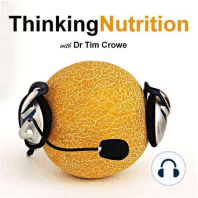20 min listen

Low-carb diets: are they the best way to manage diabetes?
Low-carb diets: are they the best way to manage diabetes?
ratings:
Length:
17 minutes
Released:
Nov 10, 2020
Format:
Podcast episode
Description
Low-carbohydrate diets are certainly on trend today. And it is for diabetes that such diets have attracted a lot of attention. Low-carbohydrate diets have without question helped many people with diabetes keep their blood sugar levels more stable and even for some people with type 2 diabetes helped to even help to fully resolve their diabetes. In today’s podcast, I look at the history of dietary recommendations for diabetes. I’ll then look at what the scientific evidence says for how effective low-carbohydrate diets are for diabetes compared to other approaches. Links referred to in the podcast Meta-analysis of low-carbohydrate diets in T2DM https://pubmed.ncbi.nlm.nih.gov/32638087 Review of different diets for managing T2DM https://academic.oup.com/ajcn/article/97/3/505/4571510Episode transcriptTo access the full episode transcript, go to the following link and select the individual podcast episode and then click on the ‘Transcript’ tab https://thinkingnutrition.buzzsprout.comConnect with meInstagram: doctimcroweFacebook: Thinking NutritionTwitter: CroweTim
Released:
Nov 10, 2020
Format:
Podcast episode
Titles in the series (100)
All things sweet: sugar and your health by Thinking Nutrition